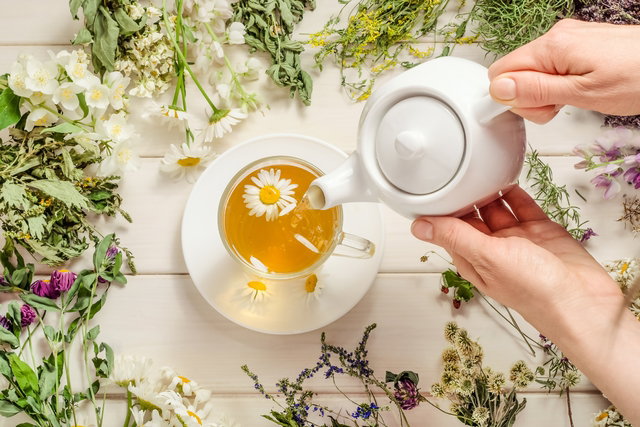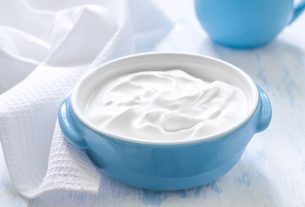Tea is a drink that brings numerous health benefits because it contains water and herbs with medicinal properties that can be useful to prevent and help treat various illnesses such as flu, sore throat or excess gas, for example.
This is because the medicinal plants used to make tea, such as chamomile, rosemary, mint, hibiscus or fennel, for example, are rich in flavonoids, polyphenols, saponins or tannins, with calming, stimulating, diuretic, anti-inflammatory or expectorant properties. .
Therefore, drinking tea, preferably without sugar, can help with various health problems, and should be used with medical or herbalist advice, as they have side effects and contraindications.

Main benefits of tea
Tea has several health benefits, the main ones being:
- Relieve symptoms of flu, colds or sinusitis;
- Aid in weight loss;
- Lower cholesterol;
- Control blood sugar levels;
- Prevent cardiovascular diseases;
- Improve sleep quality and combat insomnia, anxiety or stress;
- Reduce the risk of depression and cognitive problems;
- Combat gastrointestinal problems, such as constipation, heartburn, reflux, ulcers or excess gas;
- Improve blood circulation and combat swelling;
- Relieve headache, sore throat, gingivitis.
Furthermore, drinking tea can help improve wound healing, alleviate symptoms of rheumatic diseases, such as rheumatoid arthritis or gout, or prevent premature aging, for example. Check out the best teas for rheumatism.
Properties of teas
Teas have various properties, such as anti-inflammatory, antioxidant, expectorant, antimicrobial, diuretic, antirheumatic, calming, stimulant, antiseptic or hypoglycemic properties, for example.
These properties are due to the presence of substances in the composition of medicinal plants, such as saponins, flavonoids, catechins and polyphenols, as well as minerals, such as zinc or potassium, and vitamins, such as A or C, for example.
Types of tea
There are many types of tea that can be taken to help treat various conditions, the main ones being:
1. Weight loss tea
Some examples of weight loss teas are green tea and ginger tea because they have diuretic and thermogenic properties that lead to the elimination of fluids and toxins from the body, and increase metabolism.
To help you lose weight, these teas should not contain sugar or honey. See other benefits of ginger tea for weight loss.
How to prepare: Place 1 tablespoon of green tea + 1 cm of ginger root + 1 liter of water in a teapot and let it boil for 5 minutes. Wait 5 minutes, strain and drink throughout the day. Check out the complete list of weight loss teas.
2. Tea for cold and flu
Flu teas such as echinacea tea or mint tea help strengthen the immune system, shortening the duration of the flu and cold, in addition to having expectorant properties, which help to thin secretions, making breathing easier.
Another tea for flu is star anise tea, which has antiviral action that helps fight Influenza A viruses, responsible for the flu. See other benefits of star anise.
How to prepare: Place 1 tablespoon of the desired herb in a cup of boiling water. Leave to cool, strain and drink afterwards. It can be consumed several times a day and can be sweetened with honey because honey has antioxidants that help with recovery. See other teas for colds and flu.
3. Tea to calm down
Some good examples of teas to calm down are chamomile, lemon balm and the passion flower, which is passionflower, as they have sedative properties that help calm the nervous system, leaving the person calmer and calmer.
Another medicinal plant that is also very useful for calming is lavender flowers because it helps combat anxiety and promote sleep.
How to prepare: Place 1 tablespoon of the desired herb in a cup of boiling water. Let it cool, strain and drink afterwards. It can be taken 3 to 4 times a day.
4. Tea for gas
Some good examples of teas for gas are fennel, caraway and star anise because they have properties that help with digestion and combat gas effectively, taking effect within a few minutes.
How to prepare: Place 1 teaspoon of fennel seeds, chopped caraway leaves or star anise in a cup of boiling water. Wait 3 minutes, strain and drink immediately.
5. Tea for headache
A good tea for a headache can be tea made from white willow bark, as it is rich in salicin, a substance similar to the main ingredient in aspirin, with analgesic and anti-inflammatory effects that help relieve pain and discomfort. caused by headache.
How to prepare: Boil 1 tablespoon of chopped white willow bark with 1 cup of water and let it boil for 5 minutes. Leave to cool, strain and drink afterwards. Learn how to prepare other teas for headaches.
How to prepare teas
To prepare teas correctly and make the most of their benefits, you must follow some important recommendations such as:
- Use the recommended dosage of medicinal herbs by the doctor or herbalist;
- Let the tea rest in a glass or porcelain containerso that there are no traces of iron or aluminum that could be harmful to health;
- Pour boiling water over leaves, flowers, fruits or stems of the medicinal plant for 5 to 10 minutes, properly covered so that the vapors are not lost;
- Boil the roots or bark of the medicinal plant together with waterfor 5 to 15 minutes, so that its properties are extracted;
- Strain the tea always before consuming it;
- Drink the tea immediately after preparing it or up to 10 hours because after this period the properties of the tea are lost and the tea may not have the desired effect.
Teas can be taken at any time of the day and even as a replacement for water, but always with the doctor’s knowledge, as some types of tea may have contraindications.
Care when consuming teas
Some precautions are important to consume teas safely, such as taking the tea under medical or herbalist advice, according to the condition being treated, with doses and for the time recommended by the doctor.
This is because teas can interfere with the absorption of food or medicines, and result in nutritional deficiencies, or increase or reduce the effects of medicines, in addition to being able to cause side effects, such as nausea, vomiting, diarrhea or allergies, for example.
Furthermore, children, pregnant or breastfeeding women, or people who have heart, neurological or blood clotting problems, kidney or liver failure, diabetes, high blood pressure or glaucoma, for example, should only use teas under medical advice.

Sign up for our newsletter and stay up to date with exclusive news
that can transform your routine!
Warning: Undefined array key "title" in /home/storelat/public_html/wp-content/plugins/link-whisper-premium/templates/frontend/related-posts.php on line 12
Warning: Undefined array key "title_tag" in /home/storelat/public_html/wp-content/plugins/link-whisper-premium/templates/frontend/related-posts.php on line 13



